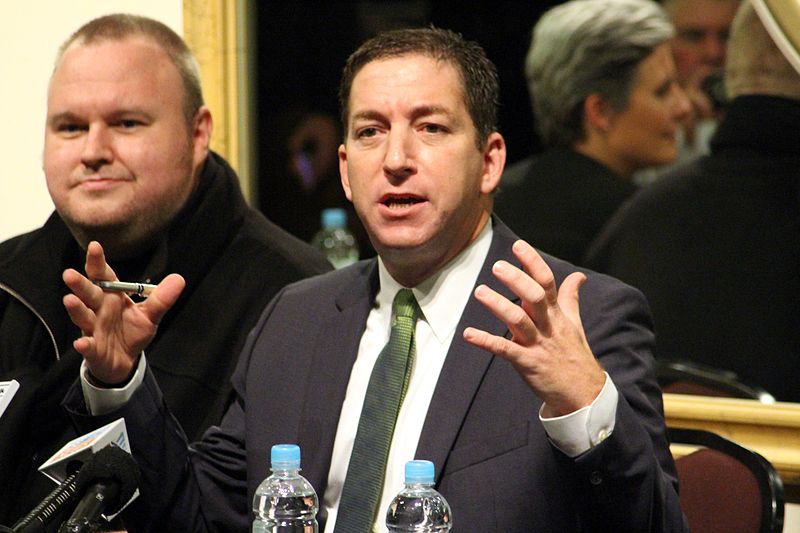Journalist Glenn Greenwald charged with cyber crimes in Brazil
The Snowden-era investigative journalist has been accused of playing a key role in hacking into public officials' mobile phones


American journalist Glenn Greenwald has been arrested in Brazil and accused of hacking into the mobile phones of public officials following an investigation.
The reporter gained notoriety for his prominent role in publishing classified material that former National Security Agency (NSA) analyst Edward Snowden obtained from the US government agency in 2013.
Through his publication, the Intercept Brasil, Greenwald published articles based on information obtained from the leaked messages of public officials within the right-wing Brazilian government.
The articles accused key members of Brazil’s justice system, and the Jair Bolsonaro-led government, of engaging in corruption.
Brazil’s public prosecutors have responded in kind by charging Greenwald with cyber crimes and for being part of a criminal organisation that allegedly hacked into these individuals’ devices, according to the New York Times.
The 95-page criminal complaint alleges that the reporter had gone beyond simply publishing information that was passed to him, but played a “clear role in facilitating the commission of a crime”. Greenwald is said to have encouraged the hackers to delete archives that have already been shared in order to cover their tracks, authorities claim.
The Electronic Frontier Foundation, an organisation committed to campaigning for digital rights, has blasted the Brazilian government for charging the reporter under its computer crime laws.
Get the ITPro daily newsletter
Sign up today and you will receive a free copy of our Future Focus 2025 report - the leading guidance on AI, cybersecurity and other IT challenges as per 700+ senior executives
“EFF has long warned that cybersecurity laws in the Americas have been written and interpreted so broadly as to invite misuse,” the organisation said in a statement. “Computer crime laws should never be used to criminalize legitimate journalistic practice. Prosecutors must not apply them without considering the chilling effects on the free press, and the risk of politicized prosecutions.
“It is a threat to democracy when authorities use cybercrime laws to punish their critics, as the Brazilian government has done here with Glenn Greenwald, and it discourages journalists from using technology to best serve the public.”
President Bolsonaro, himself, commented in July 2019 that he would relish seeing the journalist spend time in prison after he had published articles damaging his presidency. Greenwald, at the time, raised concerns that the authorities may respond by arresting and charging him.
This led to the country’s Supreme Court justice to issue an order preventing federal police from investigating the journalist’s activities with regards to the leaked information.
The prosecutors who charged Greenwald, however, said they had found audio messages that implicated the reporter in criminal activity.
Greenwald himself has denied the charges, and suggested in a statement that the country’s Federal Police examined the same evidence and explicitly stated that he had not committed any of the crimes he’s been charged with. Edward Snowden, moreover, has branded these charges as “unbelievable, unsupported, and indefensible”.
Photo by Robert O'Neill / CC BY 2.0

Keumars Afifi-Sabet is a writer and editor that specialises in public sector, cyber security, and cloud computing. He first joined ITPro as a staff writer in April 2018 and eventually became its Features Editor. Although a regular contributor to other tech sites in the past, these days you will find Keumars on LiveScience, where he runs its Technology section.
-
 AI is helping bad bots take over the internet
AI is helping bad bots take over the internetNews Automated bot traffic has surpassed human activity for the first time in a decade, according to Imperva
By Bobby Hellard
-
 Two years on from its Series B round, Hack the Box is targeting further growth
Two years on from its Series B round, Hack the Box is targeting further growthNews Hack the Box has grown significantly in the last two years, and it shows no signs of slowing down
By Ross Kelly
-
 Why the Space Force wants white hats to attack a satellite
Why the Space Force wants white hats to attack a satelliteCase study Authorities hope the first-of-its-kind competition could bring benefits to the cyber sector
By James O'Malley
-
 OpenAI to pay up to $20k in rewards through new bug bounty program
OpenAI to pay up to $20k in rewards through new bug bounty programNews The move follows a period of unrest over data security concerns
By Ross Kelly
-
 New ‘DarkBit’ ransomware gang shuts down Technion, demands $1.7 million ransom
New ‘DarkBit’ ransomware gang shuts down Technion, demands $1.7 million ransomNews A politically charged ransom note suggests DarkBit are one of the newest hacktivist gangs to emerge in recent months
By Ross Kelly
-
 Research: Luxury cars and emergency services vehicles vulnerable to remote takeover
Research: Luxury cars and emergency services vehicles vulnerable to remote takeoverNews A "global API issue" has been highlighted through months-long research into brands such as Ferrari and Mercedes-Benz, leaving owners open to hacking, account takeovers, and more
By Rory Bathgate
-
 Podcast transcript: Meet the cyborg hacker
Podcast transcript: Meet the cyborg hackerIT Pro Podcast Read the full transcript for this episode of the IT Pro Podcast
By IT Pro
-
 The IT Pro Podcast: Meet the cyborg hacker
The IT Pro Podcast: Meet the cyborg hackerIT Pro Podcast Resistance is futile - offensive biotech implants are already here
By IT Pro
-
 SpaceX bug bounty offers up to $25,000 per Starlink exploit
SpaceX bug bounty offers up to $25,000 per Starlink exploitNews The spacecraft manufacturer has offered white hats immunity to exploit a wide range of Starlink systems, with a dedicated report page
By Rory Bathgate
-
 Nomad happy to forgive hackers if they return 90% of $190 million that was stolen
Nomad happy to forgive hackers if they return 90% of $190 million that was stolenNews The crypto bridge is offering 'white hat hackers' a 10% bounty following the attack earlier this week
By Zach Marzouk